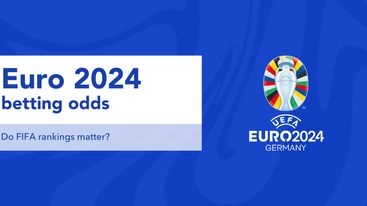Another day consigned to history, another day closer to the European Championships.
At the time of writing this article, it’s just eight days until things kick off in Germany, where Europe’s international footballing elite will gather and compete at Euro 2024.
After looking at whether major tournament experience is important in our top scorer article, it’s time to do some more digging, and this time we’re searching to see if FIFA rankings matter when it comes to major tournament success. Let’s have a look.
Do FIFA rankings matter?
As many punters do when a big international tournament draws near, I was thinking about a few Euro related things and for some reason, my mind was drawn to FIFA's rankings.
I wanted to know whether or not there’s a pattern between the rankings and tournament success, or if we can predict the winner of a tournament with any degree of accuracy by looking at the FIFA rankings.
What I’ve discovered is that you can't really predict the winner with the help of the rankings, but you simply cannot discount the best European teams according to the FIFA rankings, as obvious as that sounds.
The first European Championships to be held following the creation of the FIFA rankings took place in 1996, on English soil.
Ahead of Euro 1996, the highest ranked team was Germany, who according to FIFA, were the second best team on the planet at the time. The Germans duly obliged at Euro 1996, confirming themselves as the best team at the tournament, as the rankings suggested.
The same thing happened again four years later as France, ranked second in the world behind the Brazilians, triumphed at Euro 2000.
Since 1996, the European Championships have taken place eight times, and while the team officially ranked as the best in the world according to FIFA has won just one of those eight, high-ranking teams typically do well.
Three of the last eight Euro winners stood as the highest ranked (according to FIFA) ahead of the tournament beginning, while five of the last eight all came from the top four ranked teams that featured in the competition.
What are FIFA rankings?
For those who don’t know, the FIFA rankings are the official rankings for international football teams. Based on their performances in all FIFA-recognised international matches, nations are awarded points.
Thanks to the points awarded over a period of time, teams then move up and down in the rankings, with the highest performing teams ranking at the top and the lowest performing teams at the bottom.
Right now, there are 208 teams that are recognised by FIFA, meaning that the FIFA rankings consists of 208 teams.
The FIFA rankings were first introduced back in late 1992 and have been used ever since to determine the best international team on the planet, though many people would argue that major tournament performance is far more important when it comes to categorising which nation is the best.
For example, Belgium has been ranked as the best footballing nation in the world, according to FIFA, several times in the last decade, yet the Belgians have never won a major tournament, prompting many to pay little attention to the FIFA rankings.
Where did previous Euro winners rank?
Year | Winner | FIFA rank prior to tournament | FIFA rank if only including European teams |
|---|---|---|---|
2020 (played 2021) | Italy | 7 | 6 |
2016 | Portugal | 8 | 4 |
2012 | Spain | 1 | 1 |
2008 | Spain | 4 | 2 |
2004 | Greece | 35 | 18 |
2000 | France | 2 | 1 |
1996 | Germany | 2 | 1 |
Where did previous semi-finalists rank?
Of course, tournament success is all relative. To be successful at the Euros, you don’t necessarily have to leave with the trophy. For many nations, going deep into the competition, such as reaching the semi-finals, can be considered success.
I looked a little deeper to see where previous semi-finalists at the European Championships ranked according to FIFA just before the tournament began.
Year | Semi-finalists | FIFA rank prior to tournament | FIFA rank if only including European teams |
|---|---|---|---|
2020 (played 2021) | Italy, England, Spain, Denmark | 7, 4, 6, 10 | 6, 3, 5, 7 |
2016 | Portugal, France, Wales, Germany | 8, 17, 26, 4 | 4, 10, 18, 2 |
2012 | Spain, Italy, Portugal, Germany | 1, 12, 10, 3 | 1, 8, 7, 2 |
2008 | Spain, Germany, Turkey, Russia | 4, 5, 20, 24 | 2, 3, 14, 17 |
2004 | Greece, Portugal, Netherlands, Czech Republic | 35, 22, 5, 11 | 18, 14, 3, 7 |
2000 | France, Italy, Portugal, Netherlands | 2, 14, 15, 21 | 1, 11, 12, 14 |
1996 | Germany, France, Czech Republic, England | 2, 5, 10, 24 | 1, 4, 7, 13 |
As the table above shows, the highest ranking teams usually get to the semi-finals, or rather the semi-finals tend to feature at least one high-ranking team.
In six of the last eight European Championships, the semi-final line-up contained one of the two highest ranked teams in the competition, while in each of the last eight Euros, a team ranking in the top three at the start of the tournament (of those featuring) reached the semi-final.
Current FIFA rankings
Finally, let’s take a look at the current FIFA rankings for those set to feature at Euro 2024, which are shown below.
Team | FIFA rank | FIFA rank adjusted to show Euro 2024 teams only |
|---|---|---|
France | 2 | 1 |
Belgium | 3 | 2 |
England | 4 | 3 |
Portugal | 6 | 4 |
Netherlands | 7 | 5 |
Spain | 8 | 6 |
Italy | 9 | 7 |
Croatia | 10 | 8 |
Germany | 16 | 9 |
Switzerland | 19 | 10 |
Denmark | 21 | 11 |
Ukraine | 22 | 12 |
Austria | 25 | 13 |
Hungary | 26 | 14 |
Poland | 28 | 15 |
Serbia | 33 | 16 |
Czech Republic | 36 | 17 |
Scotland | 39 | 18 |
Turkey | 40 | 29 |
Romania | 46 | 20 |
Slovakia | 48 | 21 |
Slovenia | 57 | 22 |
Albania | 66 | 23 |
Georgia | 75 | 24 |
Summary - Do FIFA rankings matter?
So, do FIFA rankings matter? To be honest, the answer isn’t amazingly clear-cut. I’d say that recent history tells us that a team standing outside the upper echelons of the rankings is unlikely to win the tournament, with seven of the last eight winners ranking 8th or above.
However, the highest ranking team at the tournament doesn’t always win, winning only three of the last eight renewals.
I guess the bottom line is that FIFA rankings matter in that they can help to disregard half of the teams that will be in attendance in Germany, but does it make it easy for us to find the winner? Not really.
From looking at the above data, we know that the winner will almost certainly be high-ranking, but which of the high-ranking teams will win? Who knows, and maybe that’s what makes big international tournaments so exciting.
Author

With over 12 years of experience, Bradley Gibbs is a seasoned sports betting writer and tipster specialising in uncovering value bets across football, horse racing, tennis, and golf. His extensive coverage of these sports has been featured on numerous websites and in The Racing & Football Outlook, a renowned UK betting publication. Bradley's expertise lies in identifying betting edges and delivering insightful, data-driven content for informed wagering.
With over 12 years of experience, Bradley Gibbs is a seasoned sports betting writer and tipster specialising in uncovering value bets across football, horse racing, tennis, and golf. His extensive coverage of these sports has been featured on numerous websites and in The Racing & Football Outlook, a renowned UK betting publication. Bradley's expertise lies in identifying betting edges and delivering insightful, data-driven content for informed wagering.
Related
.png)






